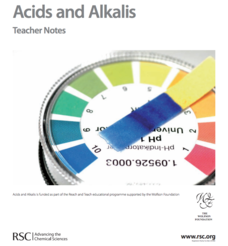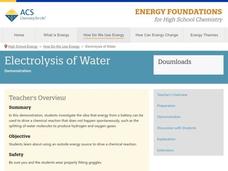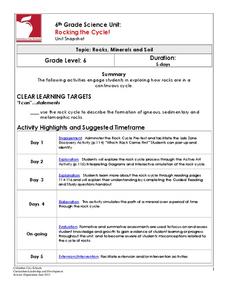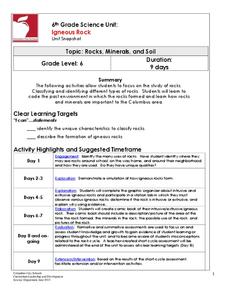Queen's Printer for Ontario
Evaluating Wartime Posters: Were They Good Propaganda?
"Back Him Up!" Scholars will analyze how World War I posters displayed, on the home front, often attempted to stir up emotions. As they examine the different ways people used propaganda posters during the war, they will create their own...
Science 4 Inquiry
Maintaining Mass
Can you disprove the law of conservation of mass? Pupils observe the teacher weigh each part of a reaction. Then, the teacher weighs the result of the reaction and everyone sees that the products do not equal the reactants. Then they...
Science 4 Inquiry
Bubbles and Colors and Smells...Oh My!
A demonstration of elephant toothpaste hooks pupils' interest as they complete multiple experiments with colors, smells, bubbles, and more. By the end, they understand the differences between physical and chemical changes in the world...
Science 4 Inquiry
Enzymes in Action
Enzymes play a role in almost every function in the human body. Scholars explore three variables related to the use of enzymes. They observe a catalase reaction, experiment with substrates, and examine reactions rates.
Royal Society of Chemistry
A Visible Activated Complex Experiment
When was the last time your class saw a catalyst in action? Chemistry scholars observe an activated complex during an engaging experiment. Through both color change and evolution of a gas, individuals gain insight into the...
Royal Society of Chemistry
Acids and Alkalis—Gifted and Talented Chemistry
Looking for a comprehensive plan for teaching acid-base chemistry? Science scholars discover acid-base interactions through a thoughtfully written unit. The resource is divided into paced activities and individual work designed to...
Royal Society of Chemistry
Equilibria—Gifted and Talented Chemistry
Teaching is a balancing act! Keep things on an even keel with a comprehensive equilibrium lesson plan. The resource covers reversible and irreversible reactions, Le Chatelier's Principle, and the industrial applications of equilibrium...
Oceanic Research Group
Heat Transfer and Cooling
Astronauts train underwater to simulate the change in gravity. An out-of-this-world unit includes three hands-on activities, one teacher demonstration, and a discussion related to some of the challenges astronauts face. Scholars apply...
American Chemical Society
Electrolysis of Water
Young scientists know that water is H2O, but can they prove it? Through a simple electrolysis of water demonstration, scholars see the two gases produced as a result of a chemical reaction. Because this reaction doesn't happen...
American Physiological Society
Effects of Environment on Enzymes
Much like the tale of Humpty Dumpty, proteins, once altered, will never be the same again. Honors and pre-AP biology classes explore the delicate world of enzymes via a Webquest and lab experiment. The teacher's guide contains all...
Columbus City Schools
Changes All Around Us
Whoa! What just happened? That's right, change is everywhere. But what exactly is changing? Middle school science sleuths get to the bottom of the changes matter can experience. Through simple demonstrations, engaging videos, and an...
Columbus City Schools
Rocking the Cycle!
Time to rock out! Discover the "life" cycle of the average rock using an illustrative stations lab and stimulating pairs game. Roll the dice to determine your fate: will it be melting in magma or chilling out to form igneous rock? The...
Columbus City Schools
Igneous Rock
These rocks are HOT! Well, they used to be, anyway. Take young geologists on a two-week journey through the life and times of the average igneous rock. Lab groups work together to hypothesize about intrusive and extrusive igneous rock...
Columbus City Schools
ABC: Acid Base Chemistry
Bubble, bubble, boil and trouble! What causes common substances like baking soda and vinegar to react the way they do? Welcome your junior chemists to the wonders of acid-base chemistry using a comprehensive and fun resource. Engage them...
Columbus City Schools
To Measure its Mass or Volume?
Atoms, elements, and molecules, oh my! Teaching the fundamentals of chemistry to curious sixth graders has never been easier to accomplish. Here is a resource that pulls together everything needed to get them off to a good start,...
Global Oneness Project
Freedom to Change
Here's something unusual and thoughtful: have your scholars do some pensive reflection themselves before tackling how such meditative techniques are used in prison rehabilitation programs. They watch the "Path of Freedom" video found...
Science Matters
Volcano Models
More than 80 percent of the earth's surface originated from volcanoes. The 16th instructional activity in a 20-part series introduces the shape and development of volcanoes. It begins with a demonstration using a balloon and flour to...
Science Matters
Earthquake Waves: Wave Notes
A multi-part lesson opens with a review of p waves and s waves. Then scholars use a simple s wave simulator to view the way the wave travels. Next, pupils use cups and various fluids to simulate p waves moving through different mediums....
US Department of Energy
Thermodynamics—Teacher Guide
I'm so cool! No, you're exothermic. This thermodynamics lab unit includes an introduction, teacher demonstrations, six labs that students rotate through each class day, homework assignments, application of knowledge, and assessments....
American Chemical Society
Can Gases Dissolve in Water?
Why does soda fizz when opened? Learners discuss the appearance of bubbles in soda bottles when opened. In groups, they design and complete an experiment comparing the amount of carbon dioxide dissolving in cold versus hot liquids.
American Chemical Society
Carbon Dioxide Can Make a Solution Acidic
Can your breath change the acidity in a liquid? A lesson begins with a demonstration that proves it can. Then scholars perform an experiment to determine if other gases can change the pH of liquids. Finally, they research how this...
American Chemical Society
Neutralizing Acids and Bases
Most things naturally strive for balance, and acids and bases are no exception. Neutralization of acids and bases allows scholars to explore the color changes associated with the pH scale. After this exploration, pupils neutralize two...
American Chemical Society
pH and Color Change
Did you know strong bases can feel slippery and slimy? Lesson allows scholars to practice using the pH scale to identify acids and bases and their strengths. By changing the concentration of an acid and a base, they create the entire...
American Chemical Society
Using Chemical Change to Identify an Unknown
If you discover an unknown powder, how do you determine if it is safe? Lesson uses four different tests to identify the properties of various powders that appear the same. Then scholars get an unknown powder and have to determine which...

























